Batch cocktails are the ultimate party trick
I'll never forget it. My tiny apartment was clean, the appetizers were prepped, the party playlist was cued up, and the bottles of good booze were set out on the bar. I had invited some close friends, memorized a couple cocktail recipes, and was ready to be a proper host. I felt downright organized!
Then the guests arrived and the next four hours were a blur of shaking, straining, and jiggering. At the end of the night I found myself still standing by the bar, which was a mess, mixing myself a post-party cocktail because I hadn't had a chance to enjoy my own handiwork yet. To say I was having second thoughts about throwing a party with cocktails would be a severe understatement.
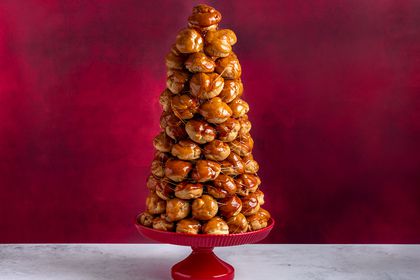
Sure, there are other ways to encourage conviviality. You can uncork bottles of wine, throw cans of beer in an ice-filled cooler, or even keep a stash of bottled or canned cocktails (or just serve shots if you’re really going for it). But there’s just nothing like a gorgeous, properly mixed cocktail to make a party feel truly festive. So the conundrum is how to have cocktails at a party without having to babysit the bar all night. That’s where batching comes in.
What is Batching?
To batch a cocktail means to scale it up and prepare a large quantity of it ahead of time. Many cocktails are great for batching, and the main advantage to doing this is to avoid having to play bartender. Batching cocktails allows guests to serve themselves delicious drinks with minimal mess, freeing you up to enjoy your own party. You can store many batched cocktails in the freezer, meaning they’ll be perfectly chilled to boot.
The Two Main Ways to Batch a Cocktail
- Scale up a drink based on a specific number of servings. This is the easiest approach.
- Scale up a drink recipe to fit in a specific vessel. After all, you have to put the cocktail in something to store and serve it. This approach is a little heavier on the math (and might appeal to more Type A people, like me), but don’t worry! We’ll work through it together.
Pick Your Poison
Some cocktails are better for batching than others. Stirred drinks, those made entirely from liquor, are the best cocktails for batching. These include:
- Negroni (and its cousin the Boulevardier)
- Manhattan
- Old Fashioned
- Sazerac
- Vieux Carré
- Martini
This doesn’t mean that other cocktails can’t be batched, but there are special considerations. Cocktails containing citrus juice (The Last Word, for example) can be batched, but the fresh flavor of citrus juice deteriorates rapidly over time and becomes more bitter as it sits. So while booze-only cocktails can be made days in advance, cocktails with citrus should sit no more than a few hours before serving. You can still mix all the other ingredients well ahead of time, but wait to add citrus juice until close to serving time.
Cocktails with a fizzy component like club soda or Prosecco can be batched as well. The key with effervescent drinks is to batch all the ingredients except the bubbles, and add those to each glass as the cocktail is served.
For cocktails made with bitters, you will want to use half the amount of bitters called for in the recipe. This is because bitters tend to become more pronounced over time in batched cocktails. If you’re scaling up a cocktail to a very large number of servings, it is helpful to know that one dash of bitters is equivalent to 0.03 ounces.
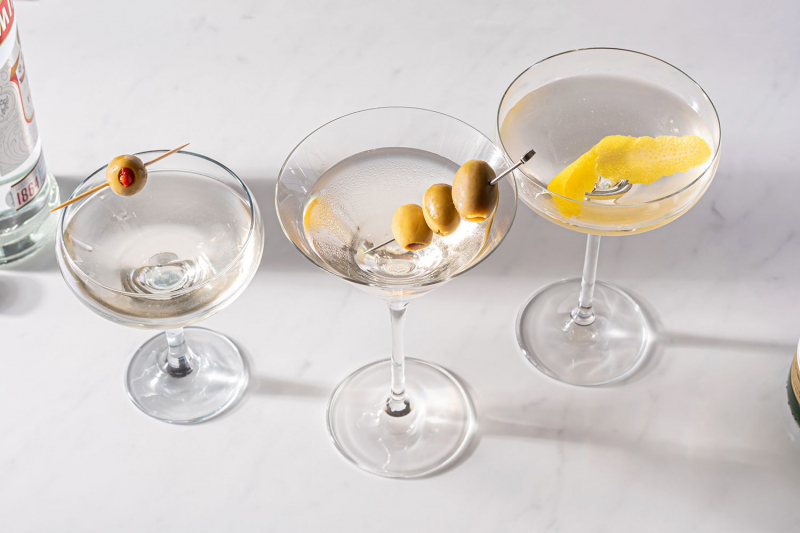
Tools You'll Need
Before you start to batch your cocktail, gather all the tools you’ll need.
- Vessel that can be used for mixing, chilling, and serving, such as a 750mL bottle (any empty, clean wine bottle) or pitcher
- A funnel for transferring ingredients to your vessel (you don’t even need this if you’re using a pitcher)
- A jigger or small measuring cup
- A long-handled spoon for mixing (if using a pitcher)
- A calculator (don’t be scared)
- Liquid measuring cup
Doing the Math
All batching requires some degree of math but there are a couple ways to think about how you do the math. You can do exact math, or you can batch cocktails using ratios. Many cocktails are just 2 parts of this plus 1 part of that, and so on.
The Negroni is a great example because it uses equal parts of only three ingredients so you could literally measure your booze with a jelly jar or, for a very large batch, simply mix a full bottle of each ingredient together.
That said, depending on how your brain works and the cocktail you want to make, one approach is likely going to be better than another. Let’s get into it.
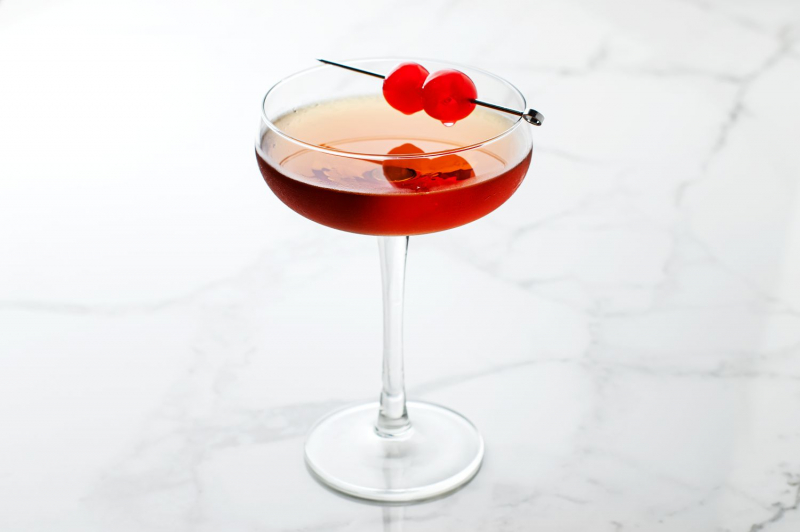
How to Batch by Number of Servings
Going by headcount is a great way to batch if you have a larger guest list and want to make sure everyone gets something to drink. In general, I argue that the larger the guest list, the less complex the cocktail should be simply because with larger parties you need to pick your battles. But if you like a challenge and don’t mind the higher cost of buying more ingredients, don’t let a large guest list keep you from achieving your cocktail dreams!
Let’s work through this approach with a simple example: the Martini. This cocktail contains three ingredients: gin, dry vermouth, and optional bitters.
Step 1: Decide how many servings you’ll need to prepare. If you have six guests, plus yourself, and want each guest to be able to have two drinks, you’ll need to multiply the base recipe by 14.
Step 2: Write out the ingredients in the base recipe like so:
2 1/2 ounces gin: 14 x 2.5 = 35 ounces gin
1/2 ounce dry vermouth: 14 x 0.5 = 7 ounces dry vermouth
1 dash optional orange or aromatic bitters: 14 x 1 = 14 dashes bitters / 2 (remember that you should only use half the amount of bitters when batching) = 7 dashes bitters
Step 3: Determine how many bottles to buy. The only wrinkle with these calculations is that liquor is sold by the 750 milliliter bottle, not by fluid ounces (thanks, Imperial measurement system!). 750mL is equivalent to about 25 1/4 ounces. With that in mind, for the example above you will need two bottles of gin and one bottle dry vermouth.
How to Batch By Vessel Size
If, instead, you want to fit your batched cocktail into a specific vessel, you’ll need to think about the math in a slightly different way.
- Determine, in ounces, the volume of a single serving of the cocktail you want to make. Using the example above, the Martini, this comes to 3 ounces.
- Determine the volume of your container in ounces. Let’s say we want to fill a clean 750mL wine bottle with batched Martini. As discussed above, 750mL is equivalent to 25 1/4 ounces.
- Divide the volume of the container by the volume of the cocktail. In this case, 25 1/4 divided by 3 equals roughly 8 (it’s fine to ditch the remainder).
- Multiply each ingredient in the cocktail by the resulting number:
2 1/2 x 8 = 20 ounces gin
1/2 x 8 = 4 ounces dry vermouth
1 dash x 8 = 8 dashes divided by 2 = 4 dashes bitters
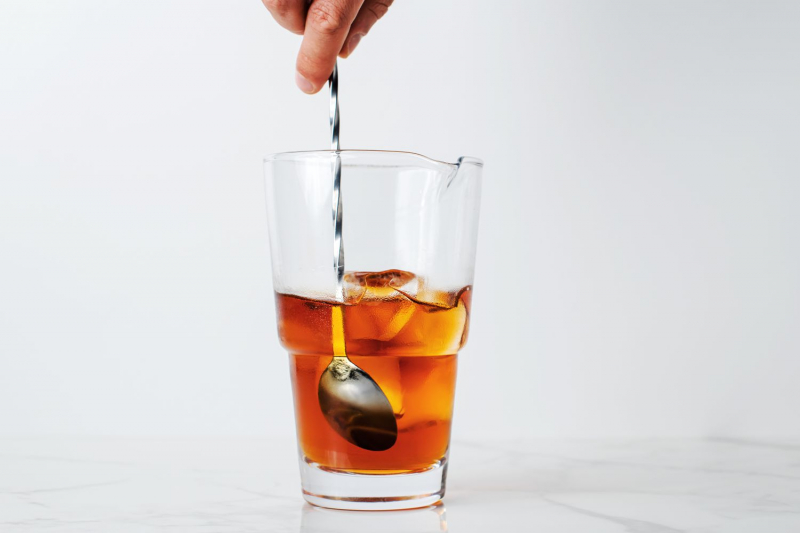
Accounting for Dilution
In the example above, the one thing we didn’t take into account is dilution. All cocktails are intentionally diluted in some way, usually by shaking or stirring with ice. This chills the drink down to a pleasurable temperature but it also improves the flavor of the cocktail by encouraging aroma molecules to be released into the air. Remember: smell is hugely important to the way we perceive flavor (just think about how flavorless food can taste when you have a head cold). So you will want to dilute your batched cocktails in one way or another.
For stirred drinks, like the Martini, I recommend pre-diluting them. In other words, adding some water along with the other ingredients when you batch the cocktail.
Here’s the easiest way to figure out how much water to add:
- Make a single drink and measure it, in ounces, before and after stirring with ice. Make sure you’re stirring long enough for proper dilution–at least 30 seconds. When you strain the drink after stirring, strain it well to get all the liquid out of the mixing glass.
- Subtract the volume of the un-stirred drink from the volume of the stirred/chilled drink.
- Multiply the resulting number by the number of drinks you want to make. This is the amount of water you should add to the batched cocktail.
- If you’re batching by vessel size, use the volume of the drink after stirring as the total volume of the cocktail and treat the water as another cocktail ingredient.
I recommend not pre-diluting shaken drinks. Shaking a drink with ice not only dilutes and chills it but also gives the drink a velvety texture that can’t be replicated if you just add water to the batched drink. That means shaken drinks will require a little more elbow grease at the time of serving, but you’re still saving the time and effort of having to measure out ingredients for every single drink.
Adjusting the Flavor
Once you’ve prepared your batched cocktail you’ll want to taste it to make sure the flavor is perfect. Taste the drink in the way the drink is going to be served. If you’re serving the cocktail over ice, taste it over ice. If you’re serving the drink up (with no ice), taste it right out of the bottle. Make sure that the drink is chilled adequately when you taste it, as temperature affects flavor and a drink that tastes overly alcoholic at room temperature may taste perfect when chilled down.
You can adjust the flavor of a batched cocktail by adding a little water if the drink is too strong or more of a specific component if the drink doesn’t taste balanced. You shouldn’t be making any large adjustments at this point, but small tweaks are ok.
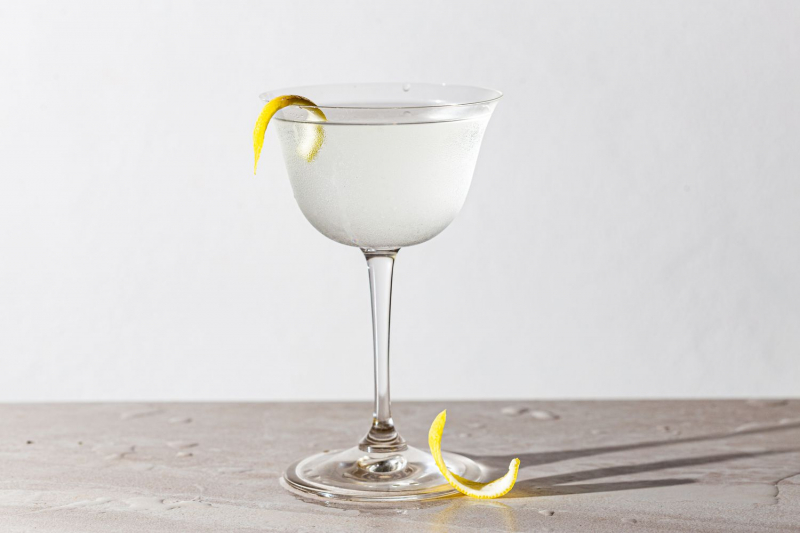
Serving and Garnishing
When batching a cocktail for a party, don’t forget the garnishes. I recommend setting up a cocktail bar in a place that’s out of the way enough so that it doesn’t block access to important, high-traffic areas (in other words, don’t put it in, or just outside, the kitchen). Give guests everything they’ll need to serve up their own cocktails, including glassware, ice in an ice bucket or small cooler, instructions for making the drink, and appropriate garnishes.
If you’ve batched Martinis, have a bowl of lemon twists and a bowl of green olives or olives already threaded onto small skewers. Old Fashioneds should be accompanied by a crock or jar of Amarena or Maraschino cherries. An assortment of vintage swizzle sticks is a fun addition to a bar, and you can find them online.
I prefer the DIY approach to cocktails at parties as it gives guests something to do and an excuse to mingle with people they might not otherwise talk to. And the best part? Now that you've done all the work of batching your cocktail ahead of time, you can just stroll over to the bar, pour yourself a drink, and bask in the festivities.